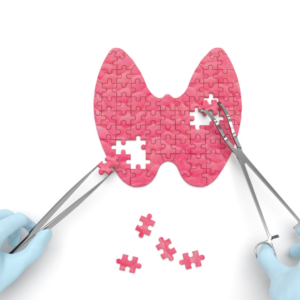

by
|
It has long been accepted that estrogen has an indirect effect on thyroid function. This makes sense, since thyroid disorders are much more common in women (typically occurring between puberty and menopause, and often following pregnancy). Recent research also suggests that estrogen and the way that estrogen receptors function may have a direct effect on thyroid cells and even play a role in the proliferation of thyroid cancer cells.
Research also suggests that exposure to environmental toxins can also play a role in many cases of thyroid disease. For example, a recent study published by Rezaei, M. et al revealed a correlation between higher levels of certain trace metals and the incidence of hypothyroidism and hyperthyroidism. The study also showed a significant connection between elevated levels of certain trace metals and thyroid cancer. The researchers concluded that “toxic metals such as lead, cadmium and chromium can increase the risk of developing hypothyroidism and thyroid cancer.”
Iodine plays a critical role in how the thyroid functions, acting as a building block for two of the hormones the thyroid produces (T3 or triiodothyronine, and T4, which is known as tetraiodothyronine or thyroxine). People don’t produce iodine naturally, so we need to get iodine through food or supplements. Once absorbed into the bloodstream, iodine travels to the thyroid where it is used to make T3 and T4. Too much iodine (e.g., following a radiation treatment) can lead to hyperthyroidism, while too little iodine (e.g., due to a nutritional deficiency) can result in hypothyroidism.
Consult: Dr. Terri shares the best ways to get iodine naturally.
These are but a few of the many causes of thyroid disorders. Autoimmune disorders like Graves’ Disease, which enlarges the thyroid, can cause hyperthyroidism, as can variations of thyroiditis (inflammation of the thyroid). Hypothyroidism may result due to a recent pregnancy, medications (lithium, amiodarone, iodine) or a congenital defect. Thyroid issues can also occur due to autoimmune diseases like Hashimoto’s thyroiditis, a condition where the white blood cells make antibodies that attack the thyroid, causing it to enlarge or shrink.
The thyroid also needs various vitamins, minerals and other nutrients to work optimally, so nutritional deficiency is a common culprit. In addition, thyroid resistance may be caused by certain disease states, including heart disease, digestive disorders, liver malfunction, lupus, muscular pain, neurological impairment, sinusitis, TMJ and sleep apnea.
Treatment varies based on the type of thyroid disorder and should be closely monitored by a medical practitioner. Depending on the condition, your treatment may require:

At EVEXIAS, we take a functional, integrated approach to patient care, which means we go beyond lab tests to find the root cause of our patients’ health concerns. Our practitioners also specialize in treating thyroid disorders and hormone imbalance, so we know what tests to perform (several thyroid tests exist) and what we need to learn from the patient during a physical exam (very important!).
Along with discussing symptoms, we’ll ask questions about family history (thyroid disorders are often hereditary), medical history, diet (iodine deficiency is often tied to thyroid dysfunction) and exposure to emotional and environmental toxins (both can contribute to thyroid problems) and other vague symptoms such as depression, anxiety, difficulty focusing and difficulty losing weight.
We also look for visual clues during the patient exam. For example, puffy face and lips, thinning or lack of hair, missing the outer third of the eyebrows, swollen skin, lack of alertness, slowed speech, hoarseness, cold extremities, weight gain and the tendency toward chronic infections are all common symptoms of hypothyroidism.
Through the analysis of lab test results, visual observations and patient feedback, the goal is to determine the underlying cause of the patient’s symptoms and formulate a treatment plan from there.
Treating thyroid disease is often a long-term—and for some patients lifelong—process. Working closely with your medical practitioner to monitor progress and adjust treatment as needed is the key to a healthier, happier life for patients with thyroid disorders.
To find out if a thyroid disorder is behind your health symptoms, contact us.
The experienced thyroid and hormone specialists at EVEXIAS are here to help optimize your thyroid health.
